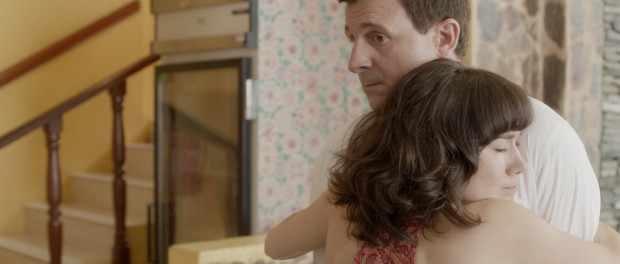Ego Trip: First World Ego Goes to the Third World
This Quebec comedy, directed by Benoiît Pelletier, produced by Denise Robert and Émile Gaudreault , script by François Avard stars Patrick Huard as Marc (in prime comic and dramatic form). An honourable mention the following cast members: Caranne Laurent as the “reste avec” orphan, Guy Jodoin as Michel (the golden hearted photographer) , adorable Étienne Poliquin as Thierry (the ever-loving son), and a magical comical turn by Antoine Bertrand as the long-suffering manager.
The film opens with Marc in full “jerk mode,” screaming and swearing at his TV colleagues, ignoring or insulting his family, fighting with his long suffering manager and as an ultimate insult, joking to his dying father that he’s bought him a magnificent urn for his ashes.
In the beginning of the movie, we see that although Marc appears to be mean, he is indeed terrified of losing his job as a once popular TV host. His audience numbers are plummeting and he is quickly being usurped by the young, new, next hot thing in TV land.
To add insult to injury, on a personal level, he reviles his dying father for his life of selfishness and workaholicism. However, despite his attempts to be a different and better type of family man, the results are disastrous. As his teenage daughter says to him, “Dad when you started out in the business, you had to climb to be up there. Then you had to work like crazy to stay there, but no matter whether you`re there, over there, in there, you’re never HERE!” Huard’s eyes speak volumes while receiving this rant.
Marc’s manager tries a charm offensive to boost Marc’s popularity and regain him a position as Quebec’s most popular TV host by sending him to Haiti as the spokesman for a NGO. His bitter personality and total disregard for others seems to be the complete wrong profile for this task and he leaves Montreal kicking and screaming to the third world.
At this point, the film takes a turn towards far too many clichés. Marc’s first world disgust of all things he perceives as third world “faults”: slowness, laziness, corruption, filth, etc. The clichés continue with the overly “assimilated” white NGO photographer, the bumbling, clownish black entertainer, the NGO worker (played with gusto by Marie-Ève Milot) who has no moral compass when it comes to getting the most gritty, pitiful story in search of donations, and finally the incredibly cynical but humorous manager pulling all the strings from Montreal.
Through many trials and tribulations, visiting the refugee camps (post-earthquake, five years later!) and particularly a chance meeting with a “reste avec” orphan girl, Marc slowly learns to appreciate the humanity and joy of a population living in misery but with joy. He seems to sum up the moral of the film when he complains, “When I try to make you all laugh, you don’t react! But when I’m angry, you’re laughing your heads off. For God sake, stop being so happy in this disaster! I have to work my butt off to TRY to be happy!”
Despite a pseudo-kidnapping, the humanity of his capturers, the people that he meets at various agencies via the NGO, and his own recognition of his own loss of humanity, Marc to return to Montreal a new man, husband and father. His heartfelt speech to his family during ransom negations is one of the most touching points in the film.
Finally, only six months later, he returns to the same village in Haiti where he is much more integrated with the population and very active in tangible improvements such as schools, medical services, commercial endeavours, etc.
All in all this is an enjoyable film with moral lessons illustrated with good humour. There are a few too many stereotypical clichés about both the first and third world depicted in the film, but they don’t take away from the greater message of humanity.
I would recommend it for a good laugh and food for thought.
Ego Trip is playing in theatres now.







